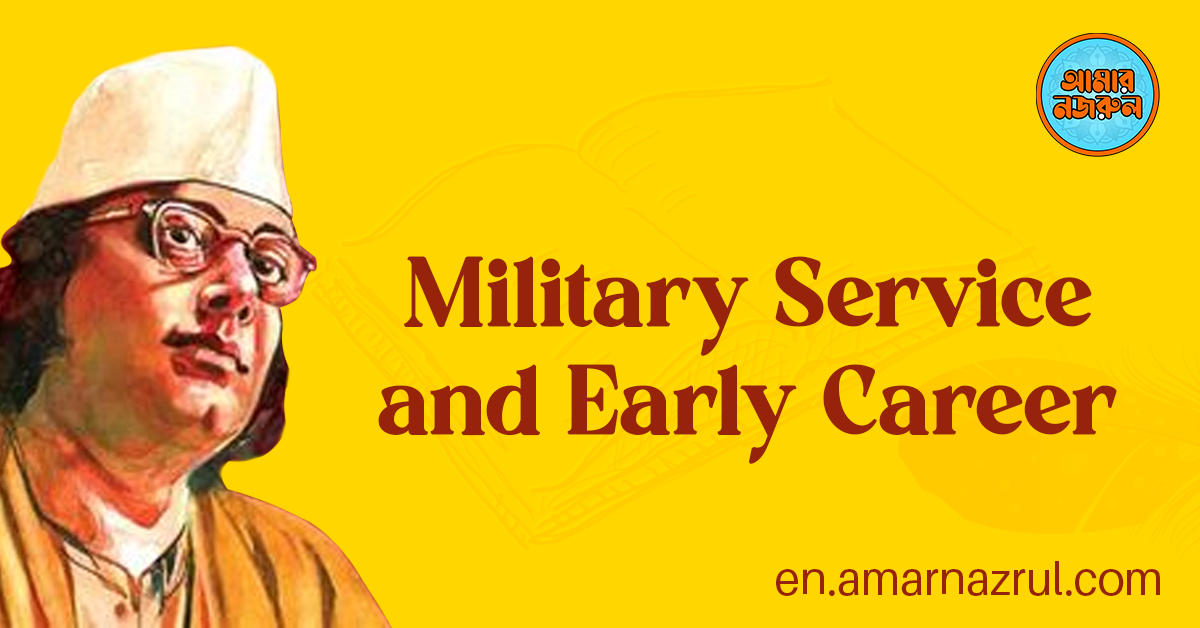Kazi Nazrul Islam, often referred to as the “Rebel Poet” of Bengal, was a multifaceted personality whose life and works have left an indelible mark on literature, music, and socio-political activism. Born on May 25, 1899, in Churulia, a small village in present-day West Bengal, India, Nazrul Islam’s journey was marked by his military service and an early career that showcased his extraordinary talents and unwavering spirit.
Table of Contents
Kazi Nazrul Islam: Military Service and Early Career

Kazi Nazrul Islam’s life was characterized by his fervent patriotism, social consciousness, and immense creative abilities. His contributions spanned across various fields, from poetry and literature to music and journalism. One of the most intriguing phases of his life was his military service and the subsequent emergence of his early career, which provided the foundation for his later achievements.
![Kazi Nazrul Islam [ কাজী নজরুল ইসলাম ]](https://en.amarnazrul.com/wp-content/uploads/2023/03/kishor-nazrul-118x300.jpg)
Military Service: The Young Soldier
In 1917, when World War I was at its peak, Kazi Nazrul Islam was only 18 years old. Eager to contribute to the cause of freedom and justice, he enlisted in the British Indian Army. His decision to join the military was driven by a desire to fight against oppression and colonial rule, which was a major part of his later writings.
Nazrul Islam served in the British Army’s 49th Bengal Regiment in Karachi. Despite his young age and limited formal education, he demonstrated exceptional courage, discipline, and dedication as a soldier. This experience not only exposed him to the harsh realities of war but also allowed him to interact with people from diverse backgrounds, thereby enriching his understanding of human emotions and struggles.
![Kazi Nazrul Islam [ কাজী নজরুল ইসলাম ]](https://en.amarnazrul.com/wp-content/uploads/2023/03/Kazi-Nazrul-Islam-কাজী-নজরুল-ইসলাম-11-266x300.jpg)
Transformation: From Soldier to Poet
Nazrul Islam’s time in the military played a crucial role in shaping his worldview and creative spirit. The horrors of war and the inequality he witnessed fueled his commitment to justice and inspired his poetry. His experiences provided him with a deeper insight into the suffering of common people and the need to challenge oppressive regimes.
It was during his military service that Nazrul Islam’s poetic talent began to emerge. He composed his first poem, “Mukti” (Freedom), which reflected his patriotic fervor and yearning for liberation. This poem marked the beginning of his poetic journey, showcasing his ability to convey complex emotions and profound ideas through his verses.
![Kazi Nazrul Islam [ কাজী নজরুল ইসলাম ]](https://en.amarnazrul.com/wp-content/uploads/2023/03/Kazi-Nazrul-Islam-কাজী-নজরুল-ইসলাম-3-1-300x196.jpg)
The Emergence of the Rebel Poet
Upon completing his military service in 1920, Nazrul Islam returned to civilian life with a renewed sense of purpose. He joined various literary and cultural movements that were striving for social reform and independence. His early works, characterized by their revolutionary themes and powerful rhetoric, resonated with a generation of young people seeking change.
Nazrul Islam’s poetic output during this period was prolific and impactful. His poetry tackled issues such as social inequality, religious intolerance, and colonial oppression. He fearlessly criticized authority figures and traditional norms, earning him the title of the “Rebel Poet.” His poems like “Bidrohi” (The Rebel) and “Dhumketu” (The Comet) became anthems of resistance and hope for a better future.
![Kazi Nazrul Islam [ কাজী নজরুল ইসলাম ]](https://en.amarnazrul.com/wp-content/uploads/2023/03/Kazi-Nazrul-Islam-কাজী-নজরুল-ইসলাম-4-300x169.jpg)
Literary Contributions and Journalism
In addition to his poetic prowess, Nazrul Islam’s early career also included significant contributions to literature and journalism. He worked for several newspapers and magazines, using his platform to raise awareness about societal issues and advocate for change. His articles were characterized by their boldness and incisive analysis, and he often used satire to expose the flaws of the establishment.
Nazrul Islam’s literary works extended beyond poetry. He wrote essays, short stories, and plays that reflected his diverse interests and talents. His ability to engage with different forms of expression showcased his versatility and creative depth.
![Kazi Nazrul Islam [ কাজী নজরুল ইসলাম ]](https://en.amarnazrul.com/wp-content/uploads/2023/03/Kazi-Nazrul-Islam-কাজী-নজরুল-ইসলাম-9-197x300.jpg)
Kazi Nazrul Islam’s military service and early career laid the foundation for his remarkable journey as a poet, musician, and socio-political activist. His experiences as a soldier exposed him to the harsh realities of life and the need for justice, while his emergence as a poet allowed him to channel his emotions and thoughts into powerful verses that inspired generations.
Nazrul Islam’s legacy continues to resonate today, not only in the literary and artistic realms but also as a symbol of courage, resistance, and the pursuit of justice. His commitment to social reform and his unwavering spirit in the face of adversity have made him an icon whose influence extends far beyond his time. As we reflect on his military service and early career, we are reminded of the transformative power of art and the indomitable human spirit.
